Why I Walk: Geoff’s Story
Geoff Gongwer and his wife Linda Martin have been volunteering at the Alzheimer’s Association since 2010. Both Geoff’s mother and father have Alzheimer’s, and are in memory care facilities. And both of their mothers, before them, died from Alzheimer’s. Geoff says that in his years of experience as a volunteer, he is constantly amazed – and saddened – by the general public’s lack of understanding of this disease. Read Geoff’s story below.
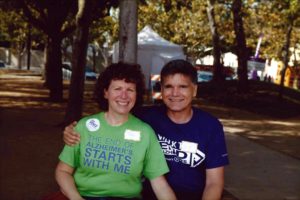 My mother was diagnosed in 2009, and is now in the final stage of the disease. She has been pretty much non-responsive for a couple of years now, and won’t be with us much longer. My father was diagnosed just last year, and still (usually) recognizes family members and a few long-time friends.
My mother was diagnosed in 2009, and is now in the final stage of the disease. She has been pretty much non-responsive for a couple of years now, and won’t be with us much longer. My father was diagnosed just last year, and still (usually) recognizes family members and a few long-time friends.
What I have learned from this experience is that Alzheimer’s is an incredibly dreadful and devastating disease. It not only robs Alzheimer’s patients of their memories, and eventually their life, but in doing so it takes away their personality, their uniqueness, their core being.
I’ve also learned how hard Alzheimer’s is on the family and friends of those stricken by the disease. For many, it is an incredible challenge to communicate with the patient, as his/her memory and cognitive skills fade. Also, differences of opinion on care choices can cause huge rifts in family relations. And the cost of care can devastate even those who previously led comfortable lives.
That is why it’s important to make sure everyone in your family has signed a Power of Attorney document, and given it to the designated person. You never know when dementia may strike, and having a plan for who will make care decisions is very important.
Another piece of advice is to realize that communicating with a dementia patient can be extremely challenging, and is very different from talking with a person with normal cognition. There are lots of resources that can help with this challenge: books, websites, and support groups – such as those run by the Alzheimer’s Association.
In the advanced stages of Alzheimer’s, there is evidence that the patient’s field of vision can narrow considerably. So when you are talking to your loved one, make sure to be directly in front of them – and talk loudly enough to be heard by someone whose hearing may also be impaired but that can’t ask you to repeat yourself.
In choosing an Alzheimer’s care facility, do diligence and use a variety of resources to learn about the services provided, and about experiences of present and past residents and their families. As is the case whenever personnel anywhere are selling a product, a good sales person can make a place sound a lot better than it is.
In deciding on home care vs. placement, consider the stress and strain on the at-home caregiver and on his/her own quality of life. Realize that it is a full-time job, and that no one can be a caregiver 24/7/365. Consider senior day care and be open to asking other family members to help by taking a regular “shift”. It helps to be aware of the fact that being an Alzheimer’s caregiver requires skills that very few people pick up through normal life experience. There are lots of resources available to help develop the needed skills: again, check out web sites, books, and alz.org.
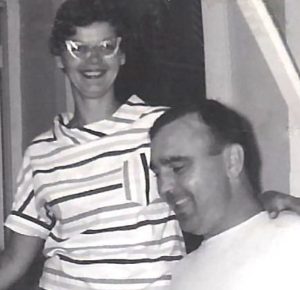 My wife Linda and I have been volunteering at the Alzheimer’s Association since my mom was first diagnosed. We volunteer because there is such a critical need to increase Alzheimer’s research funding. Society must find a cure for this terrible disease, or it will literally bankrupt our medical care system.
My wife Linda and I have been volunteering at the Alzheimer’s Association since my mom was first diagnosed. We volunteer because there is such a critical need to increase Alzheimer’s research funding. Society must find a cure for this terrible disease, or it will literally bankrupt our medical care system.
Linda and I volunteer by staffing Alzheimer’s Association tables at area health fairs, to help spread awareness of the disease and of the family services that the Alzheimer’s Association provides.
I volunteer because I was there when my mother’s first great-grandchild was introduced to her. Because of Alzheimer’s disease, she has no idea that this tender event ever even happened. And I want to do whatever I can to bring us to the day when heartbreaking events like this no longer happen.
In our support of the Sacramento Walk To End Alzheimer’s, Linda and I have helped solicit gift card and product donations from a variety of businesses and corporations. These donations are then used as fundraising incentive awards for Walk participants. And for the second year, we are also soliciting and organizing Walk day refreshments so that participants will have healthy snacks and drinks to fuel their walk.
We will also be volunteering at this year’s Sacramento Walk, which will take place on October 1st. Everyone can join their upcoming nearest Walk to End Alzheimer’s. And the Alzheimer’s Association has a year-round need for volunteers in a variety of roles.
Helpful information related to this post:





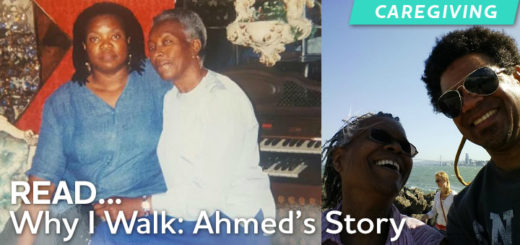
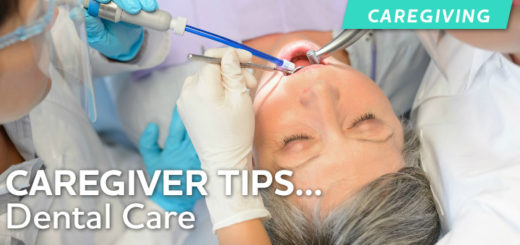
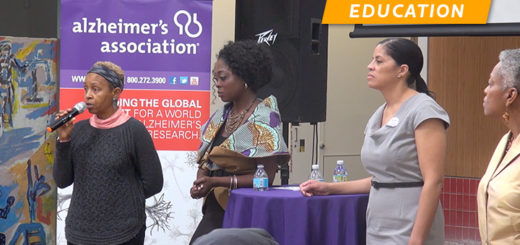










Geoff and Linda, you are true champions for the cause! Thank you for all you do for our organization, and for the millions of individuals dealing with Alzheimer’s disease. See you at the Sacramento WALK on October 1st.